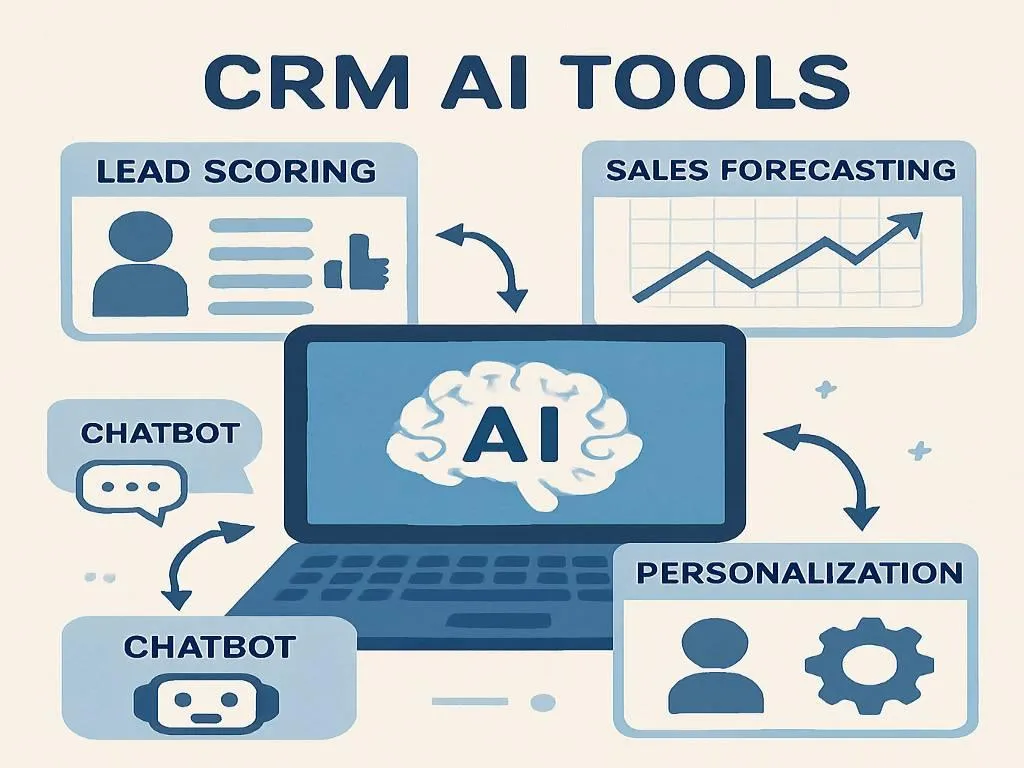
Grow Your Business: Nexurate's All-in-One CRM Guide for 2025
Discover how best all-in-one CRM platforms help business to generate more lead generation & more sales with automation, analytics, and integrations.
Why All-in-One CRM Platforms Are a Game-Changer in 2025
Running a business in 2025 without a solid Customer Relationship Management (CRM) system is like trying to drive a Ferrari blindfolded—powerful engine, no direction.
CRM platforms today are no longer just about storing customer information. The best all-in-one CRMs combine sales, marketing, service, automation, and analytics into one powerhouse. And yes, they seriously boost lead generation and sales. If you're still juggling tools or relying on Excel sheets, you're leaving money on the table.
Let's break down how best all-in-one CRM platforms help business to generate more lead generation & more sales—with real-world examples, easy-to-understand analogies, and tips you can act on today.
1. Centralized Data = No More Guesswork
Imagine walking into a meeting with complete visibility of every customer touchpoint. CRMs make that possible.
Benefits of Data Centralization:
360° view of the customer: Sales, marketing, and support teams are always in sync.
Personalization at scale: Target emails, messages, and offers based on actual behavior.
Better decision-making: No more gut-feel; use data to drive actions.
Case Study: A Singapore-based SaaS company consolidated five tools into a single CRM. Result? A 42% increase in leads within 3 months and 28% faster deal closures.
2. Automated Lead Nurturing: Your 24/7 Sales Assistant
Automation is like cloning your best salesperson—and putting them to work around the clock.
Lead Nurturing Workflows That Convert:
Triggered emails when leads take specific actions
Personalized SMS or WhatsApp follow-ups
Cart abandonment reminders for eCommerce
“Our automated lead workflows recovered 19% more abandoned carts in Q1 alone.” – E-commerce Marketing Head, Dubai
3. Sales Pipeline Management That Actually Works
Your pipeline shouldn’t be a guessing game.
All-in-one CRMs offer visual, customizable pipelines so you can:
See exactly where each deal stands
Prioritize hot leads
Set automated follow-up reminders
Bonus: You can create custom stages for unique sales cycles—like B2B, real estate, or high-ticket coaching.
Example: A real estate firm in California used CRM pipelines to segment buyers. They saw a 37% increase in property closures in under 6 months.
4. Built-In Marketing Tools for More Leads
No need to hop between Mailchimp, Google Sheets, and a landing page builder. Modern CRMs handle it all.
Built-in Features Include:
Email marketing campaigns
Lead capture landing pages
Social media integrations
Paid ad tracking
“We slashed our martech spend by 58% using one CRM with built-in landing pages and email automation.” – Digital Agency Owner, London
5. Seamless Integrations With Your Favorite Tools
CRMs today are like the Swiss Army knife of business tech.
Popular Integrations:
Google Workspace & Outlook
Stripe, PayPal, Xero, QuickBooks
Facebook, Instagram, LinkedIn Ads
Shopify, WooCommerce, Zapier
Want to get notified in Slack when a new lead converts? Your CRM’s got you.
6. AI-Powered Analytics for Smarter Selling
AI is not sci-fi anymore—it’s helping businesses sell smarter.
AI Features in CRM:
Predictive lead scoring
Sales forecasting
Suggested next-best actions
“We used AI lead scoring and shortened our sales cycle from 30 days to 18.” – B2B Tech Startup, Berlin
7. Mobile CRM for Sales Teams On the Go
Your sales reps aren’t chained to a desk. Your CRM shouldn’t be either.
Mobile Features That Matter:
Voice-to-text notes
Push notifications for lead updates
Geo-tagging for client visits
A field sales rep in Kuala Lumpur closed 3 deals in one week using mobile lead notifications.
8. Client Communication Tracking = No More “I Forgot to Follow Up”
Never lose a sale due to missed communication.
Communication Tools:
Email tracking & templates
Built-in SMS, WhatsApp, and calling
Shared team inboxes
“Our team follow-up rate improved from 57% to 92% in two months.” – B2B Services Firm, Sydney
9. Smart Lead Segmentation to Hyper-Target Campaigns
You wouldn’t sell gym memberships to marathoners the same way you would to first-timers, right?
CRM Segmentation Tactics:
Group leads by behavior, location, or industry
Score and tag based on intent
Run micro-campaigns with higher ROI
A digital course creator increased webinar signups by 64% using CRM-based lead segmentation.
10. Boosting Team Productivity and Accountability
Let’s face it, spreadsheets don’t hold people accountable.
With CRM Dashboards, You Can:
Assign and track tasks
Monitor performance metrics
Celebrate top performers and coach low-performers
“We used CRM dashboards to gamify our sales process—monthly leaderboards doubled our closing rates.” – Insurance Company Manager, Manila
Conclusion: It’s Time to Invest in an All-in-One CRM
The market is fierce, attention spans are short, and tools are many. But the best all-in-one CRM platforms help business to generate more lead generation & more sales by bringing everything under one roof—from data to delivery.
Whether you’re a solopreneur or scaling enterprise, a robust CRM can be the rocket fuel your growth engine needs in 2025.
So what’s next?
✅ Get a Free Digital Marketing Audit to find the right CRM for your business.
✅ Start a 14-day free trial with platforms like Nexurate CRM, Zoho, or HubSpot.
✅ Stop juggling and start scaling!
FAQs: Your Burning Questions Answered
1. What’s the difference between a basic and all-in-one CRM?
A basic CRM stores contact info. An all-in-one CRM manages sales, marketing, automation, and analytics—saving time and increasing conversions.
2. How soon can I see results after using a CRM?
Most businesses see improvements in lead tracking and follow-up within the first 30 days. Sales increases often follow within 60–90 days.
3. Can small businesses afford all-in-one CRMs?
Yes! Platforms like GoHighLevel or Zoho CRM offer affordable packages starting under $100/month.
4. Which CRM is best for eCommerce?
Look for platforms that integrate with Shopify, WooCommerce, and offer automated email campaigns. Examples include HubSpot and Klaviyo.
5. Is CRM hard to set up?
Nope! Most modern CRMs offer drag-and-drop tools, onboarding support, and tutorials. Some even have done-for-you setups.